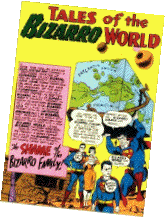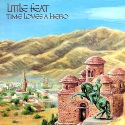
|
||||||||||||||||||||||||||||||||||||||||||||||||||||||||||||||||||||||||||||||||||||||||||||||||||||||||
Things are transitioning in DaveLand. http://dw.posterous.com/how-to-find-all-my-writing Dig we must!
RSS of BitTorrent, Programmable Twitter client My new blogging method is to post stuff where ever it might make sense to do so, and hoping to be able to bring it all back together through various mechanisms. In the last couple of days I've written three pieces I think Scripting News readers would want to see: 1. Reviewing the RSS generated by BitTorrent sites. The goal to help improve the quality and uniformity of their metadata, perhaps to allow more distributed applications to be built around BitTorrent, and perhaps make the network more robust and useful, and potentially more lucrative for the content owners. But where I'm starting is with the obvious fixes, and there's lots to do. 2. We need a programmable Twitter client. It took me a long time to figure this out, but I think it would be a huge accelerator. Turn over the tools of innovation to power users. It's always been this way, but somehow in the last couple of decades we've forgotten that programming tools belong to users too. Unix, DOS, Lotus, Emacs, dBASE, all pointed this way. Time to go back to our roots. 3. Journos as Ski Patrol. I've been explaining the "reboot" in news by comparing it to skiing in the 50s and 60s, when the amateurs arrived, changing the sport forever. Tech note -- the first piece was written on a WordPress site, the second on a Tumblr site and the third on my Posterous. My authoring tools let me write for all these platforms, in exactly the same way. All are excellent products, but their capabilities are different.
Everyone got along, though there were a few moments where, in the past, things might have flamed out. There are two reasons why this year was special. 1. We learned this year how important we are to each other. 2. The advent of Shea Stadium Rules. Maybe I don't even need to explain them to you. I think baseball people get this. And mine is a family of baseball people. Just to be complete.. There's no fighting in Shea Stadium among Mets fans. We may fight with fans of the other guys, but when you cut to the core, a guy wearing a Mets hat is family. There's a deep bond we share. It goes much deeper than words. So while we may disagree, when we're in Shea Stadium, we don't fight. So, in a family gathering, just invoke the same rules you do inside your team's ballpark. What else needs to be said other than it works. It really does. Give it a try. PS: When I explained it to a longtime friend who is a Cubs fan, he understood immediately. Of course he calls them Wrigley Field Rules. PBS and BBC could boost BitTorrent
Previously, they indexed torrents for all programming that was submitted, without concern for who owned the copyright. A Dutch court ruled that they could no longer do that. So now they only index torrents where copyright ownership can be validated. Note the Mininova never stored the content, just links to files that pointed to the content. Probably some uses of the site were illegal, in some jurisdictions, even though the mainstream media has generally been saying all uses are illegal. For example, consider this BBC article. I often used Mininova to locate downloads of BBC programming. I've watched excellent dramatic series such as State of Play and documentaries on black holes, Darwin, wars, you name it. I also used Mininova to find PBS shows such as Frontline, Bill Moyers and Nova. For example, last night I watched an episode of Frontline about credit and debit cards that would be hugely more powerful if everyone who had a credit or debit card would watch. It opened my eyes. An hour totally well spent. I don't know how the BBC and PBS feel about this. Part of the purpose of this essay is to put the question out there. Since neither network charges directly for programming, is there any reason not to make the programming freely available over BitTorrent? I've been trying to figure out the best way to ask this question, and decided that making a public appeal to both PBS and BBC was the best approach. Please consider making your content available, with your permission, via BitTorrent. You were warned. http://blog.rsscloud.org/post/259781743/fake-popularity-stats-for-real-time-feeds Hope you like!
Thanksgiving is the best holiday. You don't have to believe in any particular god to be part of it, or even believe in god at all. This holiday includes everyone. All you have to do to participate is be thankful. We have other inclusive holidays. July 4. Veterans Day. Martin Luther King's birthday. But Thanksgiving is the one that's about thanks. This being the year of Twitter lists, I made a list of the people on Twitter who I'm thankful for. It's a dynamic thing. I'll be adding to it over the next few days but I'm not going to point to it though, because it'll be a short-lived thing. Rather than make a big list here on the blog, I've whittled my Thanksgiving thought down to one idea that I'd like to express thanks for. The mystery of life. At some point in childhood we realize we don't have a clue what existence is about, or the limits of existence. I think everyone reaches this point, whether or not they believe in god or an after-life. I think religion is a way to bundle up the confusion in a box and put it Over There so we can get on with living. Every so often something happens, a family member or friend dies, and that makes the confusion come front and center. And once in a lifetime someone as close as a father dies, and that floors you. You get knocked down, and as you come back up, you're not the same person you were before. The mystery of life and the question of existence after life, they're always there, but they loom much larger after a loss. I am not a member of the church of "I Know There's Nothing" after death. My father, however, was a member. He said he knew there was nothing. Me, I'm a mystic about What It All Means. I celebrate the mystery of it. I think, by extrapolation, that every species thinks it's the highest form of life. Largely because they can't experience the existence of higher forms of life, even when they're there. An example. Think about a bird. We think we're more conscious and more intelligent than a bird. Maybe we are. But is the bird aware that we exist? Not sure about that. Maybe we're like weather to birds? Or earthquakes or locusts. Does the bird acknowlege our superior intellect? More doubtful. Now just go down the hierarchy a few steps and sooner or later you reach a species that isn't aware that we exist. And assume it's true that we are superior, that means that a superior form exists for them that they are not aware of. So now put your focus on the human species. How could it be that we are the most advanced species there is? That would seem pretty lucky. And if we weren't the most advanced, if there were superior beings walking among us, would we even be aware of them? I think we wouldn't. 8/28/96: "Do they have bee priests and doctors to provide spiritual context, or to shrug their shoulders and say that nothing can be done?" And with mysteries that we can identify but have no clue how to explain (like the conflicting theories of the universe that apply in black holes) -- is it impossible that there are species in the universe who have figured it out? And if they have, what capabilities does that knowledge give them that we can't even imagine? Think back to the human species before Einstein formulated the Theory of Relativity. In some ways we haven't changed, but in others, we're a whole new species just because of that one discovery. Physicists believe there is a theory that pulls all existence together into a single framework, and it's not hard to imagine that the knowledge that flows from that theory will lift our species to a new level. Maybe right there, at that moment, we will become a higher form of life? Hard to know until it happens. Okay, so what does all this mean? Well, there's an arrogance to saying you know that there's no existence before or after life. That our soul, the core of our being, our awareness, is just wasted when we die. That there is no purpose to living. No purpose at all. It's arrogant to think you know that. Because the fact is you don't know. It also betrays a pessimism that is all too common in our species. Maybe it's just survivors and refugees like my father who had this pessimism. Hard to know. I think it's clear that the only rational answer to all the questions that our species is not yet equipped to answer: Who Knows. Put them in a box, over there, close the box and go on living. And once a year, on Thanksgiving Day, thank the box, and hug someone close to you, eat too much food, watch some TV, go for a walk and get ready for Christmas. Happy Thanksgiving everybody!
How (slowly) we add metadata to tweets
These bits of data all live outside the 140 character "limit." Every good idea people come up with for Twitter involves latching a new piece of metadata to a tweet. And in the middle you have a conflicted, slow and arbitrary (and opaque) decision-making process, controlled by one company. Shouldn't the architecture of tweets be open to any kind of data that anyone thinks of? If you make a Twitter client please, start pushing your users' updates to a RSS feed on a server outside of twitter.com. It's just a backup. That's the first easy small step down the path of free evolution. Once someone does that, there are more steps. To get an idea of what's possible, I recommend reading A better design for Twitter retweets. Wouldn't it be great if we didn't have to wait for Twitter Corp to try this out?
The goal is to have a single feed that captures all my online writing. Moving toward what I call the Loosely-coupled 140 character message network. Yesterday I also spoke with the lead developer at Posterous. We worked out an addition to their API that would make my software work with theirs. Got a note late last night night saying the feature was in. Today I'll test it, and if it works I hope to report that I have Posterous working with LifeLiner. Meanwhile, TechCrunch has caught onto the idea I borrowed from Steve Rubel, almost. They noted that WordPress was growing while Twitter's growth has (perhaps temporarily) stalled. The phenomenon is not, as some have said, the "death" of blogging (I hate that word!) -- rather huge growth in blogging at the low-end as NBBs discover its joys through Twitter and Facebook. Perhaps very few of them will want more, but even a few is a lot! Expect a huge surge in medium-range and high-end blogging in the coming years, with products like Tumblr and Posterous and WordPress perfectly poised to capture the growth. Two things the Twitter guys should, imho, be thinking about: 1. How can they capture this growth as people move up-scale? Should they have a blogging network of their own? Or... 2. As people branch out they're not going to want to give up their networks on Twitter. An alternate to #1 is to fully open the Twitter architecture before the flow around it builds. The Internet routes around a funnel, which is largely what Twitter is, because it's too limiting for what users want to do. Maybe not today, but it's easy to see the day coming. Historically it always seems to work this way. A company boots up a new activity, then people get familiar with it and want all the power and don't need the training wheels. An industry appears where there used to be a company. More news.. The TypePad guys have also gotten in touch with news that they have a new simplified REST-style API coming for their new "micro" service. I was actually looking for it. I totally get the sense that there's a critical mass developing. All these companies are competing fiercely, and they're sharp and focused and hungry. And attaining some success. I got a note from David Karp at Tumblr saying that for the first time his site is in the top 100 of all sites on the Internet. That's pretty amazing and something to be proud of. Congrats! One step at a time. This has been a pretty good week for getting things to work together. I'll keep you posted as things progress.
Who gets their news from Google? Like everyone else, I'm peripherally following the fur flying about Murdoch thinking about whether or not to block Google from searching his news sites. In the background I keep wondering if this isn't all a misunderstanding. I mean, do a lot of people get their news on Google? That's a question. Okay I know I'm not average, so I don't mean to say my experience is statistically significant. For all I know everyone else is getting their news on Google. But I really don't think so. Here's what I think. I think other sites grabbed most of the flow in news before Google got around to doing news, and such habits are hard to break. I guess that Yahoo is still the leader in online news and CNN and MSN are #2 and #3. After that, there's a lot of noise. Somewhere down there is Google. In the dust. People say silly things like Google would be nothing without the NY Times, but it wasn't until relatively recently that the Times let Google index their news stories. I know this because I had a Long Bet with Martin Nisenholtz that I won more or less by default. Times articles couldn't show up in the ranks on Google because the Times wouldn't let them! It was dumb not just cause it meant that Martin lost the bet, but it was dumb because they let Wikipedia become the authority on so many topics that the Times would have done a better job at, imho. And they were throwing away flow, and flow is money. So I think a lot of this debate is uninformed and generating a bit of heat and not much else. Kind of like a lot of what passes for news these days.
Pity the poor NBB who was born before there were blogs. You can imagine this person wandering the planet with some unspecified sense of purpose. Scratching his or her head, wondering what exactly it is they were supposed to do with their lives. Of course that's a joke, because this instinct had many ways to be satisfied before there were blogs, but it wasn't as easy as it is for people today. I tripped across this in trying to puzzle out what was disturbing about the Julie & Julia biopic. Both main characters were clearly NBBs, and perhaps both deserved their own movies. Smooshing the stories together made for a confusing mess. I was more interested in Julia Child, the proto-proto-blogger, the blogger before there were bloggers, because her spirit is what NBBs everywhere do. Americans should understand French cooking, says Julia. It's hard, she says, but you can do it. So, did she just wring her hands and wish for it? No, she took matters into her own hands (a phrase Jay thought was pivotal) and made it happen. That's the spirit we love! It seems that the spirit of blogging and the spirit of America are wrapped up in each other somehow. This came up in yesterday's Rebooting the News, which if I do say so myself, was one of our best. We get into the subjectives of what makes natural-born blogger. Here are some of the ideas. 1. An NBB doesn't wait for permission. 2. A NBB explains things, even when they don't understand. An NBB is often proved wrong, to which the NBB shrugs his or her shoulders and says something like Shit happens. 3. NBBs go first. If there's an NBB around you don't have to wait for a volunteer. 4. NBBs err on the side of saying too much. If you find yourself wishing someone would just STFU you're very likely looking at an NBB. NBBs annoy the hell out of you. And if they're good, they get you to think. There's the big value in having us around. We foster thinking. When I say someone is a Natural Born Blogger, it's the highest praise I know. I am not annoyed by them, but I know that often people are annoyed by me. I don't plan to change. So who are some NBBs? My mother, for one. It's where I got my NBB gene. I never had to explain to her why she should blog, she just knew. The mechanics of blogging software weren't so natural to her, but she eventually figured it out. Robert Scoble is a total NBB. He has an opinion about everything. I often want to strangle him, but then I realize sheez he has a point. Dan Gillmor, Doc Searls, Jeff Jarvis and Howard Weaver are NBBs. Most good reporters are, but I suspect most of the true NBBs in journalism left about 10 years ago. I was schooled in how the web worked by the striking news writers in the Bay Area in 1994. We came across this in our podcast yesterday. Good reporters and good bloggers == same thing. In American history, Thomas Jefferson and Ralph Waldo Emerson were bloggers. Who else? You tell me.
I supported WordPress right off the bat. Then I wanted to do Posterous, but they are missing one parameter on their API for editing a post. As a result you can post something but if the user wants to revise it, they have no choice but to do it through the web interface, can't do it through the API. Tumblr doesn't have this limit, nor does WordPress. I have gotten in touch with the Posterous team and made the feature request. I've also checked with Steve Rubel, the most famous (imho) Posterous user to confirm that there are no desktop editing tools for Posterous. Confirmed. Without this simple addition to the API, it would be impossible. I know I am putting pressure on them to add the feature. But it's in a good cause. I want to enable people to use their product in the same way they use the other publishing environments. Talking with Steve earlier today he says something obvious that's worth repeating. There is a position between the lightweight Twitter and the heavyweight WordPress. And Tumblr, Posterous and now TypePad are positioning themselves right there. I expect this sweet spot to become more important over time. Twitter is, no doubt, introducing a great number of people to the joys of blogging. When they want more, some of them will certainly move to these "lite" blogging tools. I assumed that because we elected Obama to end the war in Iraq that it went without saying that the war in Afghanistan would be ended as well. Apparently not so. The President is now considering an escalation of the war in Afghanistan. I can't imagine he will not face substantial opposition in the US and elsewhere, if the answer is escalation. I will be working to change this, and if it means working against the Democrats and the President, so be it.
How Hollywood portrays bloggers
1. State of Play. A remake of a brilliant BBC series that was so bad, that portrayed the blogger in such a superficial and humiliating fashion, that I actually walked out in disgust. (A movie has to be very bad for me to walk out on it.) 2. Julie and Julia. I saw it last night, and stayed to the end. I was just as angry at the way they portrayed the blogger, but it turns out for an opposite reason. In this case the dishonesty was reversed, the blogger wasn't at all heroic, and they misrepresented the hero, Julia Child, who was, in many ways more of a true blogger than the blogger! Kind of funny how that works. A blogger isn't just someone who uses blogging software, at least not to me. A blogger is someone who takes matters into his or her own hands. Someone who sees a problem that no one is trying to solve, one that desperately needs solving, that begs to be solved, and because the tools are so inexpensive that they no longer present a barrier, they are available to the heroic individual. As far as I can tell, Julia Child was just such a person. Blogging software didn't exist when she was pioneering, but it seems that if it did she would have used it. Julie used blogging, but Julia was a natural-born blogger. The dishonesty in the story was how they portrayed Julia Child's reaction to Julie Powell's writing. They didn't explain why she disapproved. If you just went by what the movie said you could easily think she was bitter or closed-minded or jealous of young Julie. Luckily the archive is still on the web, and a simple Google search turned up the answer. Julia Child considered The Julie/Julia Project a stunt. She said of Powell: "She would never really describe the end results, how delicious it was, and what she learned." There's a lot more in a Publisher Weekly interview with Judith Jones, Child's editor at Knopf. Now, that makes sense! I'd love to see a movie that captures the heroic spirit of blogging. Like all inspiration, it's rare, but that's why it's worth making a movie about. The story of the nobility of blogging largely remains, imho, untold. A few notes about the propriety of reporters accepting free followers from Twitter. 1. On Friday, in an interview with Twitter COO Dick Costolo at a TechCrunch conference, Mike Arrington observed that when TechCrunch ran a piece about Twitter Corp they didn't like, they were taken off the Suggested User List. I wrote this up here on Scripting News. Costolo didn't comment, but the issue is clearly on Arrington's mind, as it should be. They're back on the list. Does this influence their coverage and if so how? (TechCrunch people should note this is a question, not a statement.)
Pieces like this always provoke challenges from people at the publications such as the Guardian and the Times. So be it. I think they are clearly wrong in accepting the free boost from an important and growing media network like Twitter. In the old days they were gatekeepers and could suppress a story like this if they didn't like it. Thankfully we don't live in the old days. Further, I think political candidates who accept promotion from Twitter are going to have problems down the road. They operate under special rules, and I'm sure that there will eventually be a monetary value placed on SUL placement and it will count as a campaign contribution. Imho there will be even more serious consequences for incumbents who accept free followers from Twitter and other networks. Think about how handicapped the news organizations are going to be in covering this story when they have their own issues around placement on the SUL. The only ones who will be able to cover this story without the appearance of being in Twitter's pocket are ones who opted out. As far as I know, no reporters, columnists or news organizations have opted out.
Not sure what kind of blog it is, but saving the posts to a PDF (as mentioned on the site) isn't much of a solution. We hope each of us is creating a record. The time to think about how your words will last over time is before you're leaving the job. Think about it and do something while you're writing. Choose software that's easy to archive. Ideally you should just have to make a copy of a folder to back it up. Most bloggiong software is nowhere near that simple. If you have any ideas how to creat a backup of that blog please post a comment here or there. Update: The blog is in archive.org.
This evening I got an email from the Twitter support person BFF, who explained: "Your account was suspended because our specialists found that your tweets were primarily links to other sites and not personal updates, a violation of Twitter Rules." http://help.twitter.com/forums/26257/entries/18311 It's true of that account but it's also true of the NYTimes and many other news oriented Twitter sites. I suggest they take another look at this. And it's a reminder once again that we're playing in someone else's ballpark here, and they make the rules. This is not in any way like the Internet. Update: Alex Howard quotes Twitter co-CEO Biz Stone saying Twitter "has long outgrown the concept of personal status updates."
Of course Mike Arrington asked him the "Is RSS Dead?" question, and thankfully Costolo didn't want to go there. It would be ingracious of him, of course, because he made $100 million with RSS. He said RSS had been "pushed down" the stack, and it was now a protocol like SMTP or HTTP. In a way I agree with him, but only so far. RSS was never anything more than a protocol like SMTP or HTTP. So it hasn't gone anywhere. It's still exactly where it has been since 2002, it's part of the fabric of the Internet, and is the standard format for news distribution. We're lucky to have a standard format for that. But... Had Arrington asked me the question, I would have answered it differently. RSS will form the basis for the open distributed version of Twitter. The loosely-coupled 140-character message network. RSS already has everything we need, including a protocol for realtime updates. Further, any vendor of a Twitter client would, imho, be well-advised to spread out to achieve independence from the Twitter company. One way to do that, and they should all do it, is to support Facebook on an equal basis with Twitter. But that isn't enough. They should all make an investment in the open distributed way of doing what Twitter does. What that means is to offer the user the option to create a backup of their tweet stream in RSS, as a publicly-accessible feed. And once there's a base of apps doing that, they should add a feature to subscribe to those feeds. Key point: Once they're there, they can add core features without waiting for Twitter. Of course Arrington didn't ask me that question, and that's fine -- that's his prerogative. But there's nothing to stop me from answering it anyway! I had an interesting but somewhat disturbing exchange with a Google guy on Twitter today. It reveals a bunch of disconnects, that I'm going to try, in this post, to address. 1. Please take these statements at face value. 2. I am just a person, I am not in competition with Google. 3. I am a Google user. My primary email account is on GMail. I just bought a Droid, and started a Droid blog to help other people get started. I like it primarily because it connects so well with Google services. 4. I am a former Google shareholder. I made a shitload of money from my Google investment. Thank you. 5. I think Google is a big company. I think the people at Google, like most people everywhere, mean well. Like every big organization there are some who don't mean well. But I judge each individual as a person. I don't assume because a person works at Google that they are good or bad or otherwise. 6. I don't have the first clue what it's like to be inside Google, and honestly I don't care. 7. Now about PubSubHubBub. When I first looked at it I saw Atom all over it. I quickly hit the Back button. 8. There was a time when I seriously considered implementing it. But it required me to understand concepts I didn't understand and had no interest in investing in. It seemed to me that I would have to reimplement a lot of stuff I already had working. This is something big companies ask you to do a lot of. 9. One of the reasons I revitalized rssCloud was to influence Google to support RSS better in PSHB. 10. One of the clues that PSHB needs to be reconstructed is that it's so hard to describe. What's needed here is easy to explain: Instant updates for RSS. If you think RSS is a bad choice of terms, do some research. The world sees it that way. If you make that more general, you lose people. They get confused. PSHB is very very confusing to people. That hinders adoption. 11. Fostering adoption of complex technologies is something I know a lot about. I'm very good at it. You can ignore me if you want, but I usually am right about this stuff. 12. Switching gears, I like the Internet because it means I can ignore big companies and still create meaningful software. 13. I think Google doesn't like RSS. I see that in a lot of things Google does. 14. I wish Google would give up on fighting RSS. I think it's pointless. I don't think defeating or blunting or obviating RSS has anything to do with Google's business. 15. You can argue with me on any of these points, but remember #2. If you convince me I'm wrong (which is unlikely, btw, I'm no different than anyone else in that regard), you still have just convinced one person. 16. All this disclaimed, we have a common interest, I think. I don't want to pretend to speak for Google, so I don't want to try to say what that is.
Coolest software of the decade?
For me, it might be Dropbox. I keep thinking of new uses for it. For a guy with a huge number of computers (I don't even want to count them), it's not only a lifesaver but an idea factory. I've already built utilities on it. The basis: polling a folder is incredibly low-cost. You can do a lot of it without impacting the performance of your machine. That was true in 2002 when we made Radio do upstreaming. It's even more true today. Because Dropbox wires together folders on any machine you link into it, it's a very simple content distributor. You can have 18 computers looking for something, when one finds it, they all find out and get the thing. It could be large or small. Like all cool things, it's fairly obvious, and has probably been done many times before. But they put it together now and it works and is trivial to set up. I keep thinking of things to use it for. All of which makes it very cool. Unless I'm missing something, it's my CSOTD. Update: There's a thread on this topic on Ycombinator.
If you follow me on Twitter you know that a lot of my tweets are links to stories on the web. I would probably forward other people's links more if there were a way to give them credit for the link without adding all that overhead to the text. I find that once you add a bit of text to a tweet you dilute its meaning. Do it two or three times and its a confusing mess. I don't know who said what. Worse, often the meaning of messages are reversed when they're retweeted. Not only does the person show off that they didn't understand what was said, but they propogate the mistake by sending it to all their followers. In the new method, forwarding a link through Twitter is error-free, no noise is added because it can't, and the lineage is carried as metadata, and doesn't take up any of the 140 characters. I applaud features that don't use up the 140 characters, and like even more features that give them back to us. I think Twitter should be encouraged to do more to pull data out of the text of a tweet and carry it as metadata, so apps can do stuff with it, and so people get to use the 140 chars to say what they have to say. I do almost no retweeting in the old regime. But I already do a lot more now, and will do even more once everyone has the feature. Once it's been out there for a few weeks I think we'll wonder how we ever lived without it. Journalists as ski instructors One of the cool things about riding on a train is that you meet a lot of people. There are Europeans who are visiting the US and have the train riding habit from home. There are people who remember the golden age of trains and can tell you how this or that is a shadow of its former self. And there are people who are afraid of plane travel and prefer trains to buses. There are also people like me who had a cross-country train trip on their bucket list, and found that the fantasy was better than the reality. (Partially because this trip follows the route of I-80 and I-70, which for me is well-traveled, by car.) When you're sitting with strangers in the dining car, conversation turns to What You Do, and part of my story is Rebooting The News. In explaining what was happening with the news system in the US, I came up with a new analogy this time, which I told in Rebooting The News #33, and thought I should repeat here. Journalism is like skiing in the 50s or 60s. Previously it had been a sport that very few people enjoyed, and they were all very good. But now the doors were opening to amateurs, as it did with skiing. The pros are going to have to share the slopes with people who don't take the sport as seriously as they do. They're still going to be able to ski, but the rest of us are not just going to admire them for how skilled they are, we're going to do it too. They can even earn a living as ski patrol and ski instructors. Or lift operators or more mundane jobs like people who work in hotels and drive the shuttle bus. There are still jobs in skiing after the arrival of the amateurs. But the exclusivity is gone. Is Twitter more open than News Corp? My chin fell to the floor this morning as I read a BBC article quoting Twitter co-CEO Biz Stone advising Rupert Murdoch to be more open. This got me to think about where Twitter is and where they're going and how similar it is to where Murdoch's newspapers are. In a newspaper, reporters get the prime space with the big headlines, and the readers are placed in a corner, Letters to the Editor. Or represented by a "Public Editor" who does a better job of representing the editors and owners. In Twitter there's a similar hierarchy developing, pretty rapidly. The prime space is allocated, in a totally non-transparent way, to certain people, and the rest of us are mostly talking to ourselves, in very small numbers. I was having coffee the other day with a former colleague at Berkman, Ethan Zuckerman, who said he would try to do something special if he had the millions of followers you get when you're on the Suggested Users List. I've seen people go that route. All of a sudden it's not good enough to be yourself, now you have to do something to take advantage of the flow you're able to generate. I wonder if that distortion, when it all shakes out, will be all that different from the feeling a reporter gets that he or she is more than a person writing from their own point of view. My guess is that it's more or less the same thing. Stone has made a mess of something that could have been great by not being tranparent. How ironic that he advises Murdoch on something he himself so badly needs to do. Pretty typical of the way the tech industry relates to media. Anyway, I think it's inevitable that Murdoch and many others in the media business will see the need to challenge Twitter for dominance in the realtime message distribution network. I don't see Twitter as being any more or less open than Mudoch's company. The basis for success will come elsewhere.
One of Jay's ideas for rebooting professional news applies equally, imho, to personal news. I wrote it up over at rebootnews.com. See the Droidie site for observations on the tools I carried with me on my latest trip.
Tim O'Reilly is going to give a keynote at the Web 2.0 conference about the War of the Web. You should read his piece, many good points, I agree with most of it. The tech industry sure loves its wars. And death. This is dead that is dead, everyone is dead, but me. Isn't that every child's fantasy -- to have all the world to himself, to be able to drive any car, eat any food, play with any toy, and not have to share with anyone? The other day I read that the URL was dead. Anyway one thought I'd like to share. If there's going to be a war for the web, fine, I already know what I'll do. I'll build the refugee camps. They will be very nice. Hiltons. You can have a beautiful ocean view or a view of the battlefield. We'll all take pictures from our balcony. So have a nice war, techies.
Maybe it's time for personal servers?
We called them fractional horsepower servers because the issues were different. Ease of use mattered more than scalability. And communication between servers and authoring tools was also essential. Hence XML-RPC, OPML and RSS. Instead, user generated content emerged as a business model, and many people went with the free hosting offered by startups. I never have depended on it, I've been inside too many tech companies to be willing to trust my writing with them, esp not long-term. The UGC business model only seems good for the users -- as they say if the offer appears too good to be true, it probably is. If you read the user agreement, they have no long-term obligation to host it. They probably don't even have to give you a copy of your own stuff. People ask how I use River2 while I travel. Well, my ISP, AT&T, offers a plan where you get five static IP addresses. I'm pretty technical so I know how to set it up, and I have an old laptop in my house that runs River2. I log into it even when I'm getting on from the house, but I can check what's new from an airplane at 35000 feet, where I am right now. I've not mentioned this before, but a couple of people asked me how I do it, and I told them, and neither thought I was crazy. That's a good sign. Not that Google Reader isn't an excellent product, it is. But it isn't what I like. It's okay, not everyone drinks the same beer or drives the same car. And with broadband becoming more popular, and computers cheaper, and old laptops lying around doing nothing, maybe for some people now's the time to start looking at having your own server running in your own house. It'll be interesting to see what kinds of comments this post gets. PS: There's a thread on this topic at YCombinator. Major misunderstanding, by personal server I mean one that you pay for or own, it doesn't have to be running in your house. If you pay for a server at Rackspace or EC2, that's fundamentally difference from the UGC model. That's the important difference.
Woke up in the middle of the night in Salt Lake City, went back to sleep, and by dawn we were in the middle of a whiteout with snow on the Wasatch front. Headed east from there, roughly following the path of Interstate 70, through Green River and Grand Junction. We'll get to Denver at about 7PM, which is where I will get off the train, and head to the airport tomorrow for a flight to an unnamed destination to hang with friends for a few days. Taking pictures all through the day!
Why the collection is important
But there's another even more important reason. I hope that at some point we might swing back with everyone having their own home base and that we might still have the benefit of real-time updates, and scatter the bits all over creation. I want the best of both worlds. A place where all my writing is collected and preserved and can be commented on, and having that same content appear in as many other places as people want to view it. This was the point of syndication in the first place, to give people lots of options for viewing. And while not many people knew about the cloud element in RSS, it was there since 2001, so I don't think I have to work too hard to persuade anyone that real-time updates was always part of the vision of RSS. It was. If we're going to get there, we have to start. That's what I'm doing, starting. I've always wanted to take a train across the United States. Today, I'm going to do a big part of it, from Emeryville CA to Denver. Not sure where I'll go from there, playing it by ear. I don't know how much of the trip I'll document here on scripting.com, but you can see all the activity on protoblogger.com, including a set of pictures on Flickr. All part of a grand experiment to pioneer the next generation of creative writing tools for the web. My tools: An Asus Eee PC 1005HA, standard issue (no upgrades). I'm using my Droid, tethered, and Verizon for connectivity, but have my Sprint MiFi and iPhone with me as backups. The camera is a Canon PowerShot, but I may use the cell phones for quick pictures. I'm on the California Zephyr, have a bedroom so I'll get a good night sleep, meals included and coffee (thanks for that). Want to know where I am at any given moment:
Working on new editorial tools This week I set a goal to get my next generation of editorial tools to a level where I could use them for almost everything I do online. Not yet for others to use, this is how I develop stuff. I do more than eat the dog food, think of it this way -- I am the dog. So, while I have been writing very actively online for the last few days, very little of it has been appearing here at scripting.com. Eventually I'll figure out how to migrate so that it is. Right now the place to go for it all is protoblogger.com. Which is an apt name, because I feel like what I'm doing now is the prototype for what blogging will be like in the future. Like the first generation, the new stuff mixes linkblogging and writing of longer posts. The first time I did this stuff, it was easier, all the content flowed to one place, a static server that I ran. In the second gen life was more complicated, I was running a dynamic server on the back-end (Manila) and using an outliner for the front-end. Then I went back to static on the back end, which is how Scripting News currently runs. Then I stopped linkblogging here and started on Twitter, which still must be part of my work environment, but I have a lot more to say than fits easily in 140 characters. The challenge has been to create a tool that does both, in the same place, with agility. And empowers the author. And makes it easy to scatter the writing all over god's creation and at the same time create a feeling of "home" for the author. After Automattic adopted rssCloud I decided to look at using wordpress.com as the back-end, rather with a static server. As I explored WordPress, I realized it could solve a huge amount of the problem for me, and I had no interest in doing yet another dynamic CMS, so I embarked down this path. I gotta say, now that it's all working, it's very fucking cool. I have 8 different WordPress blogs and my links flow through Twitter too, all from one window. This gives me so much more power than I had before, and I suspect a lot of other people are dealing with this kind of complexity too, but I am managing it. I love the complexity instead of it being in my way. It took a lot of work, both conceptual and programming to get this right, but I'm there now. Anyway there's no purpose to this post other than to Narrate My Work and let other developers know that this kind of editorial system is coming, and it has special needs on the back-end. There's no single rendering of the content, since it's scattered all over the place (the lifestyle of our time). But there is a new position for a static server that stores the user's full content flow. It's a low-tech workhorse of a server, but it's super-important. I have to maintain a server for the unrendered content. That works fine for me, but won't work when I get users. So the back-ends should probably evolve to not just display the rendered HTML but to allow tools to store the source code for the writing along-side. That's how writing tools should be working, imho.
The Droidie community looks at tethering And gets the answer. http://droidie.com/2009/11/10/can-android-tether-today-for-0-extra/ Blogging at it's besssst. Just got a link from my book agent Steve Hanselman, to this piece by Matt Mullenweg, on CNN -- 10 blogs to make you think. I was really proud to see my humble blog at the top of his list. And I'm proud of Matt -- he's done really well with WordPress. I'm using it all day every day and building my newest software around it. Why? It's pretty simple, and Matt says it in his piece. He listens.
There isn't enough trust in the world, imho. People can't tell, or don't take the time to find out, if someone is trustworthy. The other day I asked this question of an editor at a major newspaper -- why don't you trust your readers? I ask this of Apple, why don't you trust your users? What about the government, why doesn't it trust its citizens? Ultimately all these institutions must listen to the people they serve. The news and tech industries, even governments -- will eventually listen. The reason people are reluctant: If you extend trust, sometimes you're going to get burned. And if you never trust anyone, you'll never be hurt. But you won't have much of a life. So you have to develop a sense of who and what you can depend on. Not many guys in Matt's shoes take a chance on a guy like me. But it just takes one to make some amazing things happen! And while today's news people don't seem to trust me, all it took was one to revolutionize how news flows through the Internet. Just one. That's all. I look back to the times when I have been most effective, it's always been in partnership with someone else. That's the big secret. Take a chance, and when it works, take another, and another. Pretty soon I'm going to put another invitation out there to the universe, and I know I'll get a listen from Matt, and I hope from some other people too. Support on Twitter can't possibly work, for two reasons. 1. Can you really explain the problem in 140 characters? 2. Can it can be solved in 140 characters? Better: Find a way you can ask in a comment or email, and explain carefully what went wrong. For some reason there are two bits of movie dialog stuck in my head. 1. In Fargo, there's a scene where a random cop is talking to a bar owner who's shoveling his sidewalk, telling the story of the "funny lookin guy" played by Steve Buscemi. At the end of the story, which he just told in a beautful midwestern "you know you betcha" way, when he runs out of story, he says "That's it. (Big pause.) End of story." The moment wasn't awkward at all, quite dignified, beautifully done. 2. The big "my sister" moment in Chinatown with Faye Dunaway and Jack Nicholson. That might be the most perfect bit of dialog in all moviedom. I don't want to spoil the plot by saying why, but... Wow. The video of the scene is on YouTube. But don't click the link if you haven't seen the movie yet. Some movies you can only watch once, these movies never get old. For some reason Fargo works really well on mobile computers like the iPhone or Droid.
Ries & Trout wrote a series of books about Positioning. I love these books and have written about them many times.
In Marketing Warfare, they depict the marketplace as a battlefield, and used the principles outlined by the Prussian general Carl von Clauswitz in his writing about war. Minds are where the war is fought. Then they depict the market as a collection of ladders. On each ladder there's a number one, two and three in any market. Every marketer thinks his or her product is unique and stands alone, but what's important is what the prospect thinks. In colas there's Coke, Pepsi and everyone else. Poor 7Up wasn't even on the ladder, so they invented a new one called Uncola. It worked (but it usually doesn't). A creneau is one of these new ways of explaining something so that it stands separately in the mind of the prospect. Some creneaux exist, like laptop computers and desktop computers -- we all know the difference. Some creneaux don't exist, though marketers would have you believe they do. "The leading realtor west of the Mississippi and east of the Rockies." Yeah yeah yeah. :-) What about ladders and creneaux in markets that are developing right now. Yammer proved that there is a segment you could think of as Twitter Behind the Firewall or Twitter for Workgroups. The product and company are doing well, because that is a real segment and they are the top guy on the ladder. Some products are new but so useful that they pretty much form the whole market. Dropbox is an example. That means one of two things may happen: They may add a feature or find a new way to explain it that puts it either into a new segment of an existing market or on the ladder in an existing market. Ries & Trout believe they would do better if they did one of those. Either be second guy on the ladder in a booming market, or split off a piece of a market and own it. Standing alone isn't such a hot deal for the first guys in a market. Just ask Cromemco, Altair and Radio Shack about their leading positions in the personal computer market in the 1970s.
Then there are creneaux that I'm sure are there, but with no products in them, yet. Communicating Cameras. Oh boy what a great market that's going to be when someone goes after it seriously. No one has, yet. The iPhone is a dress rehearsal for the real product whose communication ability will be as seamless as the Amazon Kindle. The tech industry hardly notices that Amazon has solved a hard problem, in typical Amazon fashion, completely. The Kindle isn't glitzy like the iPhone or Droid, but it works so well you could say It Just Works. A high compliment. Others: Checkbox News and Social Cameras. Another creneau that I've been yammering about for years, which I called Payloads for Twitter, I'm now conceiving in a different way -- I'm giving up on Twitter doing this -- and instead hoping that Dropbox may get there first. They have already done an RSS feed for changes to dropboxes. And they have a public folder in every dropbox. If they do a minor cleanup of their RSS and support a realtime protocol such as rssCloud or PubSubHubBub, they will be squarely in what I think of as a new creneau with enormous potential -- Twitter for Content. PS: This piece ran earlier today on my Unberkeley blog. There are some comments there you may want to read.
I wrote two pieces over the weekend on the new Droidie blog. 2. The holy grail in communicating cameras. 3. Press Up to Play? Huh?? Wazzat!? I wanted an easier way to subscribe to feeds.. So I wrote down the way I'm on a site and think "Gee I'd like to subscribe to this." I see it's got an XML icon in the address bar. I click on a Bookmarklet and after a few seconds, am transported to the Feeds page in River2. To subscribe, I just click the Submit button. So that's how I made it work! :-) http://newsriver.org/bookmarklet.html Boom!
Since Father's Day on October 3, I guess I've been reflecting on this stuff more than usual, and I have a story prepared. But first, my father actually had an opinion about this, he told a story that embarassed me about how he taught me to kiss. But I'm sure I thought it was cool when I was a toddler. Kids go for that kind of stuff. But the word we're looking for is "cool" and from my point of view, as an adult, here's the coolest thing my dad did. Probably 1970 or 71. I was more than a bit of a rebellious teenager. So one day I got suspended from high school for bringing a bottle of wine to school. I was drinking with some friends in the yard before home room when the Dean of Discipline, Joseph Cotter, comes walking out, takes the bottle, escorts me to his office and calls my father to come get me. My dad drives to the Bronx from Queens, and I thought for sure I'm really going to catch it now, cause not only was I drinking wine in school, but it was his wine. I had stolen it from him. Oy. Well, my dad comes in, and instead of giving me shit, he tells off Cotter. He says why don't you leave the kids alone. My chin dropped to the floor. I couldn't believe my eyes and ears. I thought I had moved to a different planet. The Dean thought so too, he was speechless. (He and I were enemies, I was, as you might imagine, and a major troublemaker. He thought he had me, but heh he no he didn't.) So that has to be the coolest thing. On the drive home we talked about baseball and the weather, and he never punished me for taking the wine. Update: Cotter died in Y2K. Paul Carr's piece is rubbish (and disgusting) This is how TechCrunch works. They write something stupid, then people write rebuttals explaining how it's stupid, building flow and page rank. It's the same method John Dvorak explains in an interview I did with him at the Apple Store in San Francisco a couple of years ago. Anyway... Carr's piece is rubbish, and just this once I'll take the bait. Of course what the nurse at the hospital did, according to his account, was horrible. Let's say, for the sake of argument, that in addition to being a "citizen journalist" she was also a British citizen. Of course, the movie-taker shooting the end of the life of the beautiful Iranian protestor did something horrible too. Imagine, not trying to help or comfort her as she bled to death in front of him. Okay, let's concede he was a citizen journalist (whatever that is), but then humor me and assume he was British too. Or suppose the nurse and the guy in Iran were both homosexual. Or both were Christian, Jewish, Muslim, recovering alchoholics, ex-cons, single parents, only children, flat-footed, Mac users, high school dropouts, veterans, or whatever. So we could conclude that everything negative anyone ever said about Christians was true, and homosexuals and British people. This is Logic 101 and Carr failed it. And since he's bright, assume he failed it on purpose. Why? Refer to the Dvorak explanation. This is what press people do. When Dvorak teases Mac people for flow, it's dishonest, but it's also fairly harmless. But Carr is doing something different. He's using people's pain not just for his own self-glorification but also to build flow to attract more ads and money. It's two levels of disgusting. See also: Killing Straw Men. A few days ago I added OPML export to listbrowser.org. Today I want to extend that support to include information from the social network about each user. In this case, the social network is Twitter. I could see situations where this namespace might be used to present information from status.net or Facebook, when they support lists, as Twitter has. I'm going to use the name xSocial. The "x" could stand for one of two things: 1. XML or 2. Experimental, in the spirit of MIME types that are considered experimental or ad hoc, or proposals of future standards, and have an "x" in front of their names. In other words, I'm doing this because someone has to go first, and maybe someone already has, so this is my way of asking for comments (or, more likely, flames). Here's a list of elements that may appear in documents that use the namespace. xSocial:userId -- a string of characters that identifies a user. xSocial:userName -- the user's name. xSocial:userDescription -- a string of characters describing the user. xSocial:userLocation -- a string, the location of the user. xSocial:userUrl -- the address of the user's web page. xSocial:userStatuses -- the number of status messages from the user. xSocial:userFollows -- the number of people the user follows. xSocial:userFollowedBy -- the number of people who follow the user. xSocial:userProfileImageUrl -- the address of the user's "avatar" image. xSocial:userScreenName -- the name the user goes by in the network. Caveats and disclaimers: 1. Think of Twitter as establishing the precedent here. When in doubt each of these elements is defined by the way Twitter uses them. 2. Twitter keeps other information with each user, this is just the list of information that I include, now, in the OPML that's generated by listbrowser.org. I may add or remove data in the future, or use a different namespace. If it changes, I will hopefully remember to include a comment under this post. 3. Here's an example of a file that illustrates. 4. The usual disclaimers apply, including but not limited to: A. It's even worse than it appears. B. I make shitty software. C. I am not a lawyer. D. My mother loves me. archive.org's S3-alike service? An intriguing tweet yesterday from Steven Levy of Wired Magazine, which, if true, could open huge doors for future-safe archives. Brewster Kahle is talking about the Internet Archive making public S3 storage (what Amazon rents) free on their servers. Does anyone have any more info on this? If this is true, I will be building on it. Update: It's true. Here's the tweet with the scoop. I've done a bunch of little stuff for listbrowser.org, fixes and cleanups, added more data to the list pages, and most important, they now link back to the list on twitter.com. This raises the obvious question, how do you get from a list on twitter.com to the listbrowser.org version of that page? For that, we needed a bookmarklet. http://listbrowser.org/bookmarklet Follow the instructions on the page and then, any time you're on a list in Twitter and want to start exploring in listbrowser, just click on the tool. Not earthshaking, but certainly nice-to-have.
It's a good idea when starting something new that you think you're going to do a lot of to start a "newbies" site, to accumulate wisdom about. That's my site. I just posted my "stake-in-the-ground" -- where I'm at after two days using the Droid. I'm building a nest there. So far so good.
I have at least a couple of new things this weekend. The first is that FlickrFan, the Feed Reader for Pictures, has merged into River2. You can now use River2 the same way people were using FlickrFan, to subscribe to photo feeds from any source, including the AP and AFP feeds, and feeds from Flickr itself. I've explained the transition on the FlickrFan home page.
I'm sure there will be annoyances, always are, but the first-time experience is great. The web browser display is large enough to be usable. The gestures that work on the iPhone don't work on the DROID. I find both the on-screen keyboard and the physical keyboard hard to use. The keys are too small. Oddly, when entering text into Facebook or an email, typing is natural and easy. It's only a pain when entering a username or password. I wonder why this is. (Probably has more to do with the operator than anything.) The setting system makes sense. There are a few puzzlers. It allows you to format an SD card, but I don't see one. I've read the docs, very limited, but they make no mention of it. They just sent me a text message asking me to sign onto their website, but the password doesn't work. Tried 8 times. Asked them to send a new one, they sent the same one again. I'll come back to this. Took some pictures with the camera. Example. Can't figure out how to get some music onto it. Plugged in the USB cable into my Mac but it doesn't mount as a hard drive. Don't tell me I need to use iTunes -- please! Update: Quick podcast review, recorded on the DROID speaker phone using Cinch. A little baseball philosophy thrown in at no extra cost! Update: How do I get music on this thing? Tried something dumb, after mounting it on my Mac desktop, I copied the contents of a Little Feat album into a folder I named Music. Let's see if the Music app on the Droid can find it. I launch the Music app and it says Sorry, your SD card is busy. Interesting! Let me try unmounting it. I had to click in the menubar to unmount it, and then boom (sorry Steve) the music app found my Little Feat songs. This is how it's supposed to work. Goodbye iTunes. Forever. Update: It plays iPod-size movies, just watched a bit of fargo.m4v. Looks great. Update: Second podcast of the day, goes into the way Apple is becoming Google and Google is becoming Apple and why that's good for everyone. Less than 6 minutes. Worth it, imho.
I used it for a few days and decided it wasn't what I wanted. It is simple, but the text messaging feature is a hack on top of email, and they put ads for their service in the text messages, and texting is more or less one-way, and it's the wrong way for my application. It's easy for the Peek user to send text messages but virtually impossible for them to receive them. This didn't suit the application I had in mind, because I wanted the ability to send messages to the family member. I didn't think she'd be sending many on her own (she doesn't now). So I decided to opt out. There's no way to do it from the website. They don't explain how to opt out the FAQ. When I called the sales department, they said I could turn the service off, but I wouldn't be able to use the remaining time on the month worth of service I had already purchased. I said that's unacceptable. I wanted to get off the monthly plan and use the remainder of the time I had already purchased. (Maybe I'd find another use for it?) After a lot of back and forth, the service person, Jacqueline, said I should get in touch with the operations manager, David Hung. I'm going to email him a pointer to this blog post. Net-net, Peek is an attractive device, the service works reasonably well for email, but not for texting. It is simple to set up and use. However they don't make it easy to get out. At this point, I'm still going to charged for $19.95 on December 2. They'll probably do what I asked after reading this blog post, but you shouldn't have to write a blog post for what should be a routine matter. It should be easy to turn the automatic renewal off and on as you wish. Imagine a terminal program that accepted commands like:
The first few commands are obvious, the last would add scoble to a list called halfmoonbay and unfollow him.
Then I thought how nice it is for a developer to just be able to shoot the text of a tweet over at the status box on Twitter, where the user is already logged-in. But that just works for tweets. What about follow and unfollow, and list operations? And a myriad of other chores that now you can do either interactively or through the API. Why not have something in the middle, more techy than the point and click interface, but easier than the API. We already have an idea how that works -- it's a command-line interface. To be clear, there are already command-line interfaces for Twitter, but they run on the desktop. We need a CLI that runs as a web app from a public server. It could come from Twitter, Inc, or could be done by a developer. If there's more than one, it would be nice if they used the same syntax. If you're already working on this, post a note in the comments or send me an email at dave dot winer at gmail dot com.
What this means: Now any aggregator that wants instant updates of WordPress sites can have it. It was an issue for complex sites like Google Reader, that's why we enhanced our apps, so they could hook into rssCloud and provide instant updates to their users. If you use Google Reader or My Yahoo or Bloglines, tell them you want rssCloud support so you can get instant WordPress updates from sites like CNN, TechCrunch, GigaOm (and of course) Scripting News! WordPress also fixed a problem that could prevent RSS feeds from reflecting the change immediately. That was a problem because sometimes we'd receive notification that a feed had changed, and then would go read the feed only to find that it hadn't! Many thanks, once again, to the great people at Automattic.
I have a problem with entrepreneurs who say they want to Change The World. Isn't that a lot to take on? How do you know your idea for changing the world is what the world needs? What if you Change The World and instead of making it better you make it suck. What then? I am a former young person who wanted to Change The World himself. I look back at that young person, and think -- he was lovely in many ways but he made a pretty good mess of his life, because he had no clue who he was and how he got that way. Change The World? Good thing that didn't happen!
So I've recently seen the end. I don't think too many people get much further than my dad did. He lived to be 80, grew up in Europe, fled from a war, fought in a war, raised a family, was married 55 years, got an education, taught, went to museums and the ballet and opera, traveled everywhere, and I don't think he would have said, at the end, he had any idea how to Change The World. It's only youth that figures it knows, but that's because of strong chemicals and not knowing what you don't know. It's an illusion. Change is made by all of us, over many generations. The best we can do is make a few other people happy for a while, make ourselves happy, and if you do that, and leave the place a little nicer for having been here, I say -- Job Well Done! Maybe instead of changing the world, relax, and Let The World Change You. That's closer to what actually happens in life, no matter how rich or famous (or not) you are. See also: Transcendental Money. Here's the Suggested User List as a list. http://twitter.com/davewiner/twitter-s-sul How I produced it. I created a fake account, gristmillie, visited the Suggested Users page, checked them all and followed them. Then, from my own account, I went to the page of people she follows, went through each one and checked it, adding it to my list. A caveat, this will go out of date when they add more people to the list. Here's the listbrowser.org rendering, and the OPML version.
When you're displaying a list, you'll see a white-on-orange XML icon at the bottom of the page, right next to the (also new) Refresh icon. Click the XML icon and you'll get an OPML rendering of the list. You should then be able to import that OPML into Google Reader or some other feed aggregator just like any other OPML file. What that means? Like everything related to Twitter lists, it's too early to tell. But one thing is for sure, you can now use Twitter to author OPML. That in itself is pretty new idea. (It's totally new.) Here's a screen shot showing where the XML button is on my innovators list. This is the OPML version of that page. BTW, one of the reasons the OPML Editor is called the OPML Editor is that you can enter that address in the Open URL dialog in the File menu and it'll open in the editor. This is a convenient way to create mashups of Twitter lists. At this point I haven't got a way to get OPML into Twitter, but you gotta figure that's coming. I've got some more kickass features in the pipe. This is very very fertile ground. PS: The Refresh button tells listbrowser.org to get the list from Twitter, instead of using the copy it has cached. Normally it'll reload on its own after an hour, but if you just made a change to a list and want listbrowser to reflect that, just hit the Refresh button when viewing the list. I wanted a quick way to browse around to see what people are doing with the new Twitter lists feature. So I put this simple app together. If you want to jump into your own lists, or someone else's, just enter their username in the box below and click the Go button. Here are some interesting jump-off points.Patrick LaForge's Breaking News list. If you have any questions or comments, please post them here.
What's the root list of Twitter? My hard drive has a top level, it's called Macintosh HD. On PCs it's C: Yahoo's home page is the root of its directory. Suppose you were going to design a list browser for Twitter, one that would allow you to hop from list to user to their lists to other users and their lists and on and on. Where would you begin? There is clearly no top to this thing. Which imho is good, the same as the web. There is no Home Page, no place everyone starts. It's why the web is open and democratic and without a bottleneck and has no gatekeeper to keep you out. Hat's off to TBL for designing it that way. That still leaves me with the problem...
Beginning with this morning's show, at 9AM Pacific... The site is moving to wordpress.com. The feed should continue to work, but you may find that all the posts are new again now that the guids have changed. The feed is located here now. It seems that WordPress does a redirect, automatically from rss.xml (the old location) to the new one. The editorial system should work a lot better, and I hope more interesting discussions will evolve from each show.
That's at least part of the purpose of the whole push to "realtime" stuff. I've been writing about it since 1997, I called it Just-In-Time Search. Similar ideas, but not exactly. When you search for friends you always get the same old pictures, because the search engine reports them in order of relevance. Perhaps there are newer pictures, but they're nowhere near the top, and it might not even consider them relevant enough to index. We need a search engine whose primary axis is currency, that values news and images based on their newness, not by how many others are pointing to it. Google has News Alerts, but that's it. Their news system is geared toward big stories. I'm interested in the small stuff their search engine covers. There's news there too. Update: A commenter says that Google does have time-based search. I'll check it out. |
"The protoblogger." - NY Times.
"The father of modern-day content distribution." - PC World.
One of BusinessWeek's 25 Most Influential People on the Web. "Helped popularize blogging, podcasting and RSS." - Time.
"The father of blogging and RSS." - BBC.
"RSS was born in 1997 out of the confluence of Dave Winer's 'Really Simple Syndication' technology, used to push out blog updates, and Netscape's 'Rich Site Summary', which allowed users to create custom Netscape home pages with regularly updated data flows." - Tim O'Reilly.
My most recent trivia on Twitter. On This Day In: 2008 2007 2006 2005 2004 2003 2002 2001 2000 1999 1998 1997. |
|||||||||||||||||||||||||||||||||||||||||||||||||||||||||||||||||||||||||||||||||||||||||||||||||||||||
|
© Copyright 1997-2009 Dave Winer. Previous / Next |
||||||||||||||||||||||||||||||||||||||||||||||||||||||||||||||||||||||||||||||||||||||||||||||||||||||||
 Well our family Thanksgiving feast is over, and it was a major success.
Well our family Thanksgiving feast is over, and it was a major success. Yesterday the popular Mininova search engine for BitTorrent
Yesterday the popular Mininova search engine for BitTorrent  Over the years, starting in
Over the years, starting in  Why make an exception for geographic data or which
Why make an exception for geographic data or which 
 Not everyone was born to blog, but some people were.
Not everyone was born to blog, but some people were.  I continue to work on my new
I continue to work on my new 
 Jay Rosen sent a link to a post on a
Jay Rosen sent a link to a post on a  I have several accounts that I use for testing Twitter apps. One of them,
I have several accounts that I use for testing Twitter apps. One of them, 




 In response to my
In response to my 

 They explain markets in terms of metaphors that help you visualize that markets work differently from the ways we were raised to think they did. Markets are not about features, or about what you remember, they're about the map in people's minds, and about the impressions products leave, not the details.
They explain markets in terms of metaphors that help you visualize that markets work differently from the ways we were raised to think they did. Markets are not about features, or about what you remember, they're about the map in people's minds, and about the impressions products leave, not the details. So what about
So what about 

 I had to do it. Went down to the Verizon store in El Cerrito and put down $350 and bought the $99 per month unlimited texting plan. Took it home, fell in love. It really is beautiful. I'm an
I had to do it. Went down to the Verizon store in El Cerrito and put down $350 and bought the $99 per month unlimited texting plan. Took it home, fell in love. It really is beautiful. I'm an  I thought perhaps the
I thought perhaps the  I stumbled across this as I was thinking about how to implement follow and unfollow commands in
I stumbled across this as I was thinking about how to implement follow and unfollow commands in 

 A new feature of
A new feature of  Suppose there's a topic you're interested in and you want to stay current on it. What tool would you use to do that?
Suppose there's a topic you're interested in and you want to stay current on it. What tool would you use to do that?